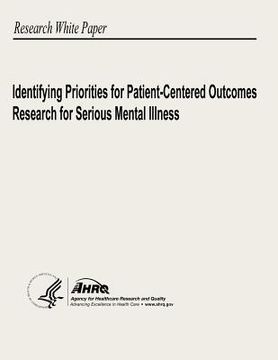Identifying Priorities for Patient-Centered Outcomes Research for Serious Mental Illness (en Inglés)
Reseña del libro "Identifying Priorities for Patient-Centered Outcomes Research for Serious Mental Illness (en Inglés)"
Comparative effectiveness or patient-centered outcomes research (CER/PCOR) has been defined by the Federal Coordinating Council for CER as "the conduct and synthesis of research comparing the benefits and harms of different interventions and strategies to prevent, diagnose, treat and monitor health conditions in 'real world' settings." The purpose of CER/PCOR is "to improve health outcomes by developing and disseminating evidence-based information to patients, clinicians, and other decisionmakers, responding to their expressed needs, about which interventions are most effective for which patients under specific circumstances." The interventions compared may include medications, procedures, medical and assistive devices and technologies, diagnostic tests, behavioral changes, and delivery system strategies. CER/PCOR designs may include clinical trials, observational studies, secondary analyses of databases, systematic reviews with or without meta-analyses, and cost-effectiveness analyses. The Agency for Healthcare Research and Quality (AHRQ) is the lead Federal agency charged with improving the quality, safety, efficiency, and effectiveness of health care for all Americans. As 1 of 12 agencies within the Department of Health and Human Services, AHRQ supports health services research to improve the quality of health care and promote evidence-based decisionmaking; AHRQ supports a variety of CER/PCOR activities through its Effective Health Care (EHC) Program. The EHC Program funds individual researchers, research centers, and academic organizations that work with AHRQ to produce effectiveness and comparative effectiveness research for clinicians, consumers, and policymakers. To contribute to its agenda for CER/PCOR activities related to mental health, AHRQ contracted the RTI International-University of North Carolina (RTI-UNC) Evidence-based Practice Center (EPC) and the Scientific Resource Center Stakeholder Engagement Team to engage a broad and representative group of stakeholders to discuss issues related to serious mental illness (SMI) in a series of three meetings (Issues Exploration Forum [IEF]), as detailed in the methods section. The results of three large comparative effectiveness trials have been sobering, and arguably have highlighted the limitations of our current ability to help many patients afflicted with schizophrenia, bipolar disorder, and depression. The overarching purpose of this Issues Exploration Forum was to contribute to the establishment of priorities to guide CER/PCOR activities in mental health by engaging a diverse group of stakeholders. We aimed to focus on an area of mental health with significant unmet need despite available interventions and an area in which conducting CER/PCOR is likely to have an impact on reducing variation and uncertainty in clinical practice and outcomes, reducing methodological and conceptual uncertainty, and reducing disease burden. Additional objectives were to identify knowledge gaps in the area of SMI and to generate and prioritize topics for future CER/PCOR, including topics for evidence synthesis (i.e., systematic reviews, comparative effectiveness reviews).

